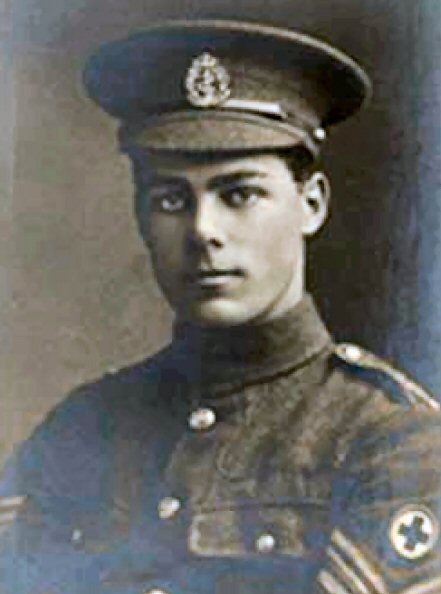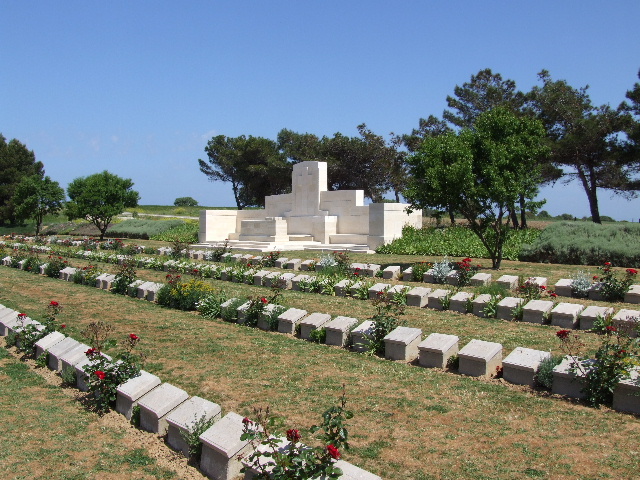Name
Austin Campbell Dent
19 Jul 1892
Conflict
First World War
Date of Death / Age
20/07/1915
23
Rank, Service Number & Service Details
Lance Serjeant
2046
Royal Army Medical Corps
88th (1st/1st East Anglian) Field Amb
Awards: Service Medals/Honour Awards
1914 /15 Star, British War and Victory medals
Cemetery/Memorial: Name/Reference/Country
LANCASHIRE LANDING CEMETERY
F. 96.
Turkey (including Gallipoli)
Headstone Inscription
UNTIL THE DAY BREAK
UK & Other Memorials
Not on the Letchworth memorials
Pre War
Wartime Service
Austen enlisted in Sep 1915 at Ipswich into the Royal Army Medical Corps joining the 88th (1st/1st East Anglian) Field Ambulance as a Territorial Soldier Private 2046. The Field Ambulance (drew its men from the East Anglian towns), was a component of 29 Division which was formed from Units recalled from Foreign service after being replaced often by Territorial Units. The 29th Division was training for deployment in France when the orders arrived for the invasion of Gallipoli. Between 16-25 Mar 1915, the Division with Austen who had been promoted early to Lance Sergeant rank, sailed with his unit via Malta to Alexandria and then on to Mudros, the deep water Harbour on Lemnos, an island of the western Gallipoli Coast. On 25 Apr 1915 the 29th Division landed at Cape Helles. The landings at Cape Helles met severe opposition, the peninsula ringed by high cliffs which made it ideal for defence. Nevertheless the strategists determined this point as being the main point of attack. Accordingly casualties were high on the landings and it was only through stubborn persistence that the allied troops pushed inland to establish a precarious foothold.
Here it was that Austen and Field Ambulances did their best to tend the hundreds of casualties from gunshot, shrapnel and the all prevailing dysentery. The months that followed the landings achieving little more than a number of cramped and overcrowded bridgeheads - none successfully linked with another. The Field Ambulance staff weaved there way through the trenches and across open ground to recover the wounded. Making their way back through the twisted network of allied defences they hurried them to makeshift field hospitals or the beachhead to be ferried out to hospital ships at sea.
No part of the bridgehead was free from enemy sniper or artillery fire and on Austen's 23rd Birthday 19 July 1915 he was shot and felled. He survived his wounds for a day and following his death was buried in the LANCASHIRE LANDING CEMETERY on the Gallipoli beachhead. (Allied forces were to abandon Gallipoli by January 1916.)
Additional Information
War Gratuity of £4 and arrears of £17 11s 5d was paid to his father. Older brother Paxton served in 1st/4th Battalion Seaforth Highlanders from Sep 1914, went to Francec in 7 Nov 1914 joining 7th (Meerut) Division in France and was killed in action at Neuve Chapelle on 28 Apr 1915. Austen's connection to Letchworth is through his father, Joseph Malaby Dent, Joseph had been born in the Britannia public house in Darlington in 1849 and was very much a dynamic self-made man in the world of publishing. All his life he was a driving force in the family firm that went on to establish an international business. In 1904, Joseph began to plan Everyman's Library, a series of one thousand classics to be published in an attractive format and sold at one shilling. To meet demand, Dent built the Temple Press in Letchworth recently founded as the first Garden City.
He brother Paxton Malaby was also killed in Great War. See additional information sheet.
Acknowledgments
Neil Cooper
Simon Coxall www.bancroftians.net/cgi-bin/bancms3.pl?dn=centdentac, Jonty Wild



